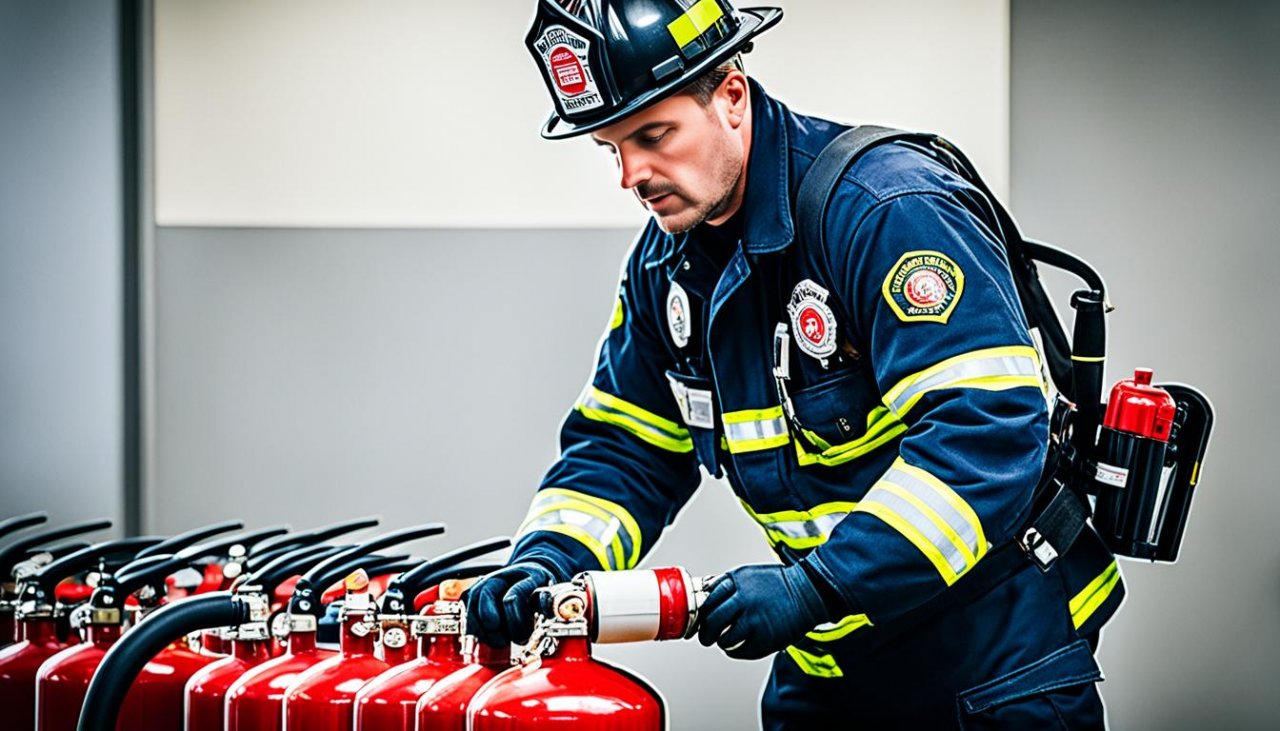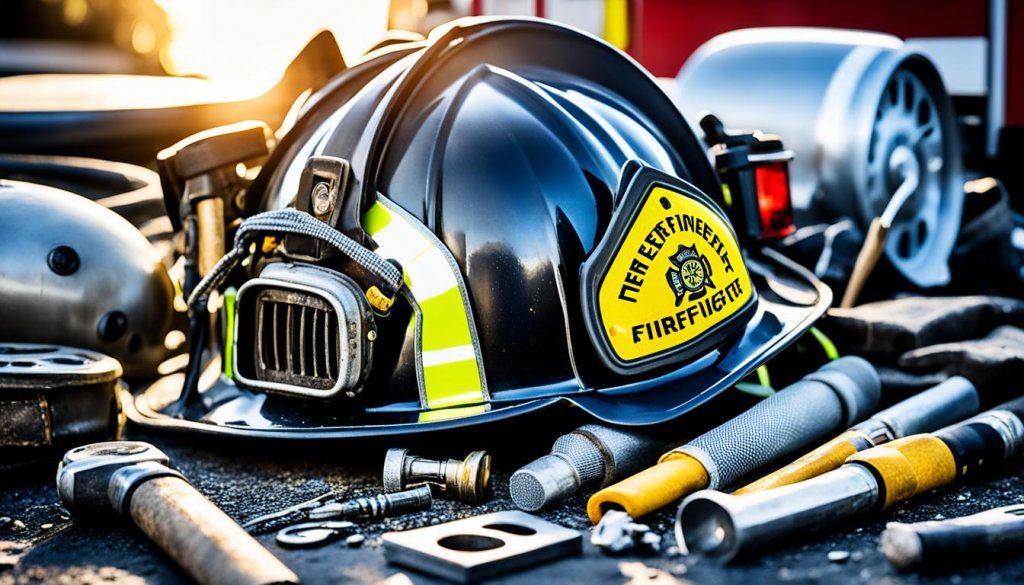Have you ever thought about how a simple mistake in fire equipment checks could lead to big problems in an emergency? These checks are not just a boring task. They are key to keeping people and property safe. By learning about fire safety checks, you’ll see how a good scheduling system can make things safer and more compliant. New digital tools are making these checks easier and faster. Using these tools saves time and cuts down on mistakes.

Key Takeaways
- Monthly checks for fire extinguishers can prevent sudden failures.
- Digital platforms like FieldInsight improve keeping records and following rules.
- Regular checks are crucial for making sure sprinkler systems work right.
- Software-driven systems reduce mistakes and make things more accurate.
- A culture of continuous improvement is encouraged through best practices in fire safety.
- Collecting data in real-time makes things more transparent and accountable for everyone.
Why Regular Inspections Matter
Regular inspections are key to making sure fire safety gear works well. Knowing my fire extinguishers and alarms are ready gives me peace of mind, especially in emergencies. I check fire extinguishers every year for damage, pressure, and easy access. This way, I’m ready for any emergency.
Reliability in Emergencies
Regular checks help prevent dangers. I test smoke detectors and alarms often to make sure they work and send signals correctly. This keeps my safety gear reliable, stopping problems when they could be most dangerous. Experts check my gear, find issues early, and help it last longer, saving money on replacements.
Compliance with Regulations
Following fire safety laws is a must, not just for safety but also by law. In places like Beverly Hills, ignoring fire codes can lead to big fines. I keep records of all inspections to show I’m following the rules and to track my safety history. Working with a licensed pro ensures I meet all standards and pass inspections with confidence.
Types of Fire Safety Equipment That Require Inspections
It’s key to know which fire safety gear needs checking to keep everyone safe. Fire extinguishers, smoke detectors, and sprinkler systems are crucial for stopping fires before they start. Regular checks on these items are a must for any safety plan.
Fire Extinguishers
Fire extinguishers are your first defense against fires. I check them every month for damage and make sure the pressure is right. It’s also important to make sure the instructions are clear.
Every year, I get a pro to inspect them to make sure they work when needed. It’s also important that everyone knows how to use them, not just the fire wardens.
Smoke Detectors and Alarms
Smoke detectors are key to fire safety. I test them every six months. This means replacing batteries and checking they work right.
These devices give you early warning to get out safely in an emergency. Keeping them in good shape is crucial.
Sprinkler Systems
Sprinkler systems also need careful checking. I make sure they’re working right by testing the water pressure and clearing any blockages. These systems can really cut down on fire damage.
They should be tested every five years or yearly, depending on their type and how they’re used.
Conducting Regular Fire Safety Equipment Inspections
Regular inspections are key to making sure fire safety equipment works well. It’s important to set up a schedule for these checks. This helps keep the equipment in good shape and lowers the risk of fires.
Schedule Routine Inspections
I always make sure to schedule checks for all fire safety gear. It’s crucial to visually inspect fire extinguishers and emergency lights every month. Sprinkler systems should be checked every three months to catch problems early.
Once a year, I have experts do a full check-up. This makes sure everything meets safety rules.
Document Inspection Findings
It’s vital to keep detailed records of what I find during inspections. These records are useful for checking we’re following the rules and spotting trends. They help us manage fire safety better in our buildings.
Professional Inspections
Getting certified pros to do the inspections is a smart move. They can spot issues that regular checks might miss. Working with experts like Fire Systems, Inc. means my fire safety gear is in top shape when it’s needed most.
Fire Equipment Inspection Scheduling
Having a solid fire safety inspection schedule is key. It makes sure equipment works well and meets safety rules. Regular checks spot problems early, avoiding big safety risks. I make sure to keep up with fire equipment inspections to maintain top-notch equipment.
Establishing and Maintaining a Schedule
First, I figure out how often to check each piece of equipment. Fire extinguishers need a monthly look-over and a full check every year. Water pipes, hydrants, and hoses should be checked every three months. This plan makes sure I don’t miss anything important in my fire safety schedule.
Leveraging Technology for Scheduling
Technology is a big help in keeping things organized. I use software to remember when inspections are due and keep track of important documents like hydrostatic testing certificates. This way, I always know what’s coming up and stay on top of my fire safety schedule. Digital tools also help me keep detailed records of inspections and make sure I’m following the rules.
The Role of Prevention
Prevention is key to keeping everyone safe. Regular checks on fire equipment help spot dangers early. This way, I can stop problems before they get worse.
Identifying Potential Hazards
Every year, nearly 3,500 fires hit U.S. office buildings, causing harm and damage. By checking things often, I can find fire risks and act fast. This helps lower the chance of loss and keeps people safe.
It’s also crucial to keep fire safety training current. This helps prevent fires and makes sure people know what to do if one happens. By focusing on prevention and maintenance, I make a safer place for all. Emergency plans also play a big part in keeping damage low during fires.
Extending Equipment Lifespan
Keeping up with fire safety equipment maintenance is key to making it last longer. Regular checks help spot wear and tear early. This way, I can fix problems before they turn into big, expensive issues. Regular maintenance is a smart move that saves money and keeps everyone safe.
Benefits of Regular Maintenance
Having a set maintenance plan helps my fire safety gear last longer. It cuts down on equipment downtime a lot. Catching issues early means fewer emergency fixes and less hassle in my work.
It also makes following the rules easier. Inspections keep a record that shows I’m meeting safety standards.
Cost Savings through Timely Interventions
Putting in the effort for regular checks saves a lot of money on fire safety gear. Spotting problems early stops sudden breakdowns. This approach cuts down on repair costs and avoids buying new equipment too soon.
This approach shows how important it is to keep my equipment in top shape.

Understanding Fire Safety Inspection Regulations
Learning about fire safety rules is key to staying safe and following the law. Each place has its own rules, based on national standards like the NFPA and local laws. Knowing these rules helps me plan for regular fire safety checks.
Local and National Compliance Requirements
Following fire safety rules is vital for protecting lives and property. All buildings, homes and businesses, must pass regular fire safety checks. They need to have the right fire detection, alarm, and suppression systems.
This keeps us safe and helps avoid fires, as most fire deaths happen at home. By following local rules, we can prevent disasters.
Common Penalties for Non-Compliance
If we ignore fire safety rules, we face big problems. Owners could get big fines and pay more for insurance. Simple mistakes, like blocked exits or broken fire extinguishers, can lead to more inspections.
If we don’t fix these issues in 30 days, we could face even more penalties. It’s important to know these rules to keep everyone safe and avoid disasters.
Choosing a Fire Inspection Service
Choosing the right fire inspection service is crucial for fire safety. I look at several things when booking a service. It’s not just about the cost. I check their experience, the services they offer, and their reputation.
A good service will do thorough inspections and offer maintenance. This meets safety standards both locally and nationally.
Factors to Consider When Booking a Service
One key factor is the vendor’s credentials and certifications. These show they know the latest fire safety rules. It’s good to know they understand NFPA standards and have a history of serving different places, like commercial kitchens and big companies.
They offer specific fire safety solutions for different needs.
Reviewing Credentials and Certifications
It’s also important to check the technicians’ certifications and training. They need to keep up with fire safety changes and equipment standards. This ensures they follow fire codes and give peace of mind that systems work right in emergencies.
Choosing the right fire inspection service means better protection, less risk, and more confidence for everyone.
See how FieldAx can transform your Field Operations.
Try it today! Book Demo
You are one click away from your customized FieldAx Demo!
FAQ
How often should I schedule fire equipment inspections?
You should do visual checks every month. Functional tests should be done every three months. And, have a professional inspect everything once a year. This keeps all fire safety gear ready for emergencies.
What fire safety equipment requires regular inspections?
Fire extinguishers, smoke detectors, alarms, and sprinkler systems need regular checks. These items are key to keeping everyone safe in case of an emergency.
How can I simplify the fire equipment inspection scheduling process?
Use digital tools with automated reminders and tracking for inspections. This makes keeping up with your fire safety checks easy.
What are the consequences of failing to adhere to fire safety regulations?
Not following fire safety rules can lead to big fines and higher insurance costs. It can also put the people in your building at risk.
Why is documentation of inspection findings important?
Keeping records of what you find during inspections is key for following the rules. It also helps you keep track of maintenance over time. This can be important for inspectors.
What should I consider when choosing a fire inspection service?
Look at their experience, certifications, and what other customers say. Make sure they meet all safety standards to feel secure.
How does regular maintenance extend the lifespan of fire safety equipment?
Regular checks catch problems early, avoiding expensive fixes. This keeps your fire safety gear working longer and more reliably.
What proactive measures can I take to identify potential fire hazards?
Check your fire safety gear often and watch for risks. Fixing problems early stops them from becoming big fire hazards.
Are there specific rules I need to follow regarding fire safety inspections in my area?
Yes, each place has its own fire safety laws, often based on national guidelines like NFPA. Knowing and following these rules is crucial.
How frequently should I check the pressure on my fire extinguishers?
Check fire extinguishers for damage and pressure every month. Also, have a professional check them once a year to make sure they work right in an emergency.
Author Bio
Co-Founder & CMO at Merfantz Technologies Pvt Ltd | Marketing Manager for FieldAx Field Service Software | Salesforce All-Star Ranger and Community Contributor | Salesforce Content Creation for Knowledge Sharing






